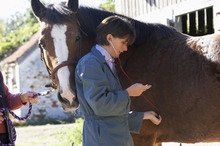A Thoroughbred mare has tested positive for equine herpesvirus at Sunland Park Racetrack in New Mexico. The horse has been euthanized. It was a case of EHV-4. The track released test results on Thursday and has restricted all horses from shipping in and out of Sunland.

Veterinarian examining a sick horse
A race horse that tested positive for equine herpesvirus at Sunland Park in New Mexico has been euthanized and proactive steps to ensure the safety of all horses on the grounds are being taken.
The horse who tested positive was Another Dollar, a 5-year-old. She was claimed for $5,000 on Jan. 9 and was euthanized four days later after becoming ill, according to a release from Sunland. On January 9, another Dollar rallied from last for fifth in a one-mile race while owned by Mario Alvarez and trained by Roy Marcom Jr. She was claimed out of the race by End Zone Athletics and trainer Karl Broberg.
âWe are taking immediate proactive steps to ensure the safety of all horses on the grounds,â the track said in a release. âAs of Jan. 21, Sunland Park will not be allowing any horse on or off its grounds. The restriction will be in place until the environment is confirmed free from EHV.â
A disinfectant program has been completed, according to a release from Sunland.
Equine herpes virus infection in horses can cause respiratory disease, abortion in mares, neonatal foal death, and neurological disease. The virus is not transmissible to humans. Damage to the blood vessels in the brain and spinal cord cause neurological signs to appear.
Horses suspected of having EHV infections should be examined by a veterinarian and tested for virus shedding. Infected horses should be isolated immediately and all contact with other horses should be avoided. Exposed horses should also be isolated.
Two main methods of prevention can be implemented to avoid EHV outbreaks. Vaccinations and biosecurity protection are both important in preventing EHV diseases and in reducing exposure.
The goal of vaccination is to induce resistance to infection prior to exposure by producing a strong and durable immune response without inducing clinical signs of the disease in the horse. Several vaccines are available for protection against both respiratory disease and abortion as a result of EHV-1 infection, but currently no equine vaccine is licensed that has a label claim for protection against the neurological strain of the virus.
Biosecurity measures include doing everything possible to reduce the chances of an infectious disease being carried onto your property by people, animals, equipment, or vehicles, either accidentally or on purpose. Anything that touches an infected horse and secretions shed by sick horses have the potential to transfer pathogens to other horses.
The immediate separation and isolation of identified suspect cases is key to disease control. Ideally, a person caring for a sick horse should not also work with or be around healthy horses. If this is impractical, it is recommended that healthy horses should be worked with first and sick horses last
